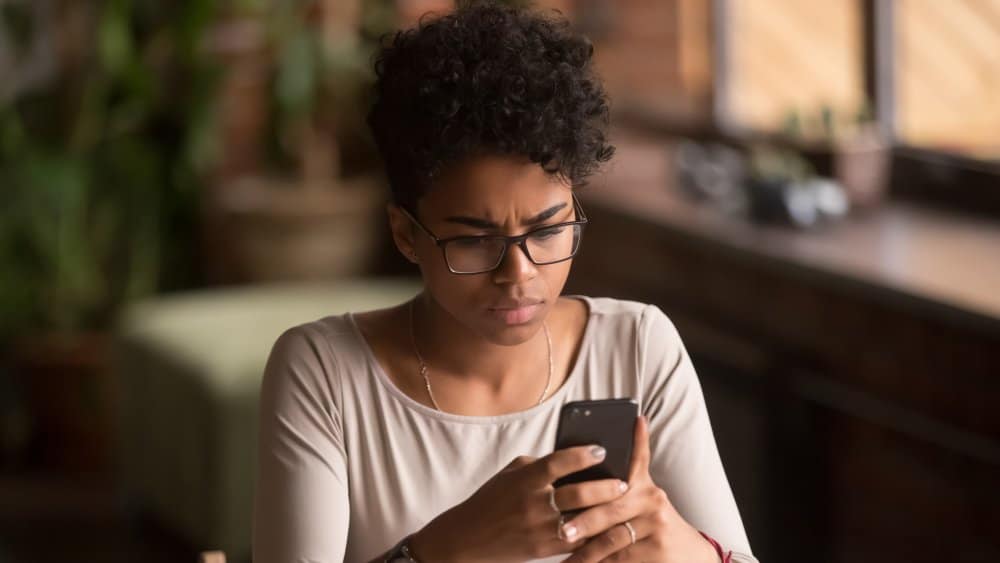Breaking up is always hard – for both parties. It’s painful to hear that your partner doesn’t feel the same way as you, but it’s equally difficult to tell someone you care about that you just can’t be with them any longer. So difficult, in fact, that it’s no surprise ghosting is on the up.

While you’d think most people would agree that a frank discussion is the best way to end a relationship, it seems that a significant number of us are disturbingly comfortable with ghosting – that is, cutting off all contact with your partner with no explanation, instead of simply communicating your change of heart.
A 2018 survey of 18 to 34-year-olds found that 71% of male participants and 82% of female participants had been ghosted – or ghosted others – at some point. It’s clear that in recent years, ghosting has gone from being an unquestioningly cruel act to almost standard practice. But although ghosting is becoming more and more commonplace, that doesn’t necessarily mean it’s right.
How it feels to be ghosted
Being ghosted is one of the worst feelings in the world. While it hurts to be dumped, at least you have closure. Ghosting, on the other hand, drags on. You’ll feel sick when you see those little blue ticks next to your last three unanswered texts. You’ll squirm at your friends’ insistence that they’re “just busy” or “ill” even though it’s been weeks. Then your heart will plummet when you see their profile pop up on a dating app, a month after you last spoke. Unlike a clean-cut break up, you’ll actually feel worse the more time passes after you’ve been ghosted.
In 2020, Heidi Priebe recounted her experience of being ghosted in Thought Catalog. “I know I’m not the first or last to experience the phenomenon but it still felt a bit like someone had punched me in the gut when it happened,” Priebe said. “The disregard is insulting. The lack of closure is maddening. You move on, but not before your self-esteem takes a hit. The only thing worse than being broken up with is realising that someone didn’t even consider you worth breaking up with.”

Priebe isn’t alone. Ghosting can – and does – happen to anyone. Author and journalist Dolly Alderton has often spoken candidly about her own experience of being ghosted, notably drawing on this in her latest novel, Ghosts. In Ghosts, Alderton’s protagonist Nina is strung along by her partner Max, only for him to vanish without a trace.
Alderton went on to articulate the pain of being ghosted in an article for Marie Claire in 2020: “What people can’t understand until they’ve been ghosted is, what you long for is reality. You get ghosted, and you go to a friend’s house who lives with someone and you can’t believe that they’re in the kitchen. You can’t believe that every day your friend wakes up and the person that she’s in love with is just lying next to her, and then gets up and has a shower, and she comes home. And he’s still drinking a beer and watching TV every night. The idea of someone being constant, reliable and real becomes the most extraordinarily unattainable and unfathomable thing when you’ve been ghosted.”
What’s the psychological impact of being ghosted?
Ghosting isn’t just a quick-fix way of breaking things off with someone – it’s a mortifying experience that can leave deep psychological scars.
According to psychotherapist Michael Ceely, ghosting triggers a stress response in us. “You immediately go to worst-case scenarios,” he tells Bustle. “‘[They don’t] like me anymore’ or ‘I must have said something wrong to [them]’ are just a few of the conclusions that you might jump to without sufficient evidence.”

If you’ve found yourself crying for days after being ghosted by someone you only met twice, you might feel as though you’re overreacting – but according to Dr. Jennice Vilhauer at Psychology Today, ghosting wreaks havoc on our brains. “Staying connected to others is so important to our survival that our brain has evolved to have a social monitoring system that scans the environment for cues so that we know how to respond in social situations,” Dr. Vilhauer explains. “Social cues allow us to regulate our own behaviour accordingly, but ghosting deprives you of these usual cues and can create a sense of emotional dysregulation where you feel out of control.”
So while it may seem OK to ghost someone you’ve only met a handful of times, you should think twice before doing it. As evidenced, ghosting can cause serious psychological damage.
So, is ghosting ever acceptable?
Considering the impact ghosting can have on a date’s psyche, no matter how well you know them, there are really very few situations in which ghosting is acceptable.
However, in conversation with Bustle, 26-year-old Lily argues that “If the person ever […] makes you feel violated or unsafe in any way, ghosting is the best option to keep you physically and emotionally safe.” Jennifer, 32, says the same: “Being polite is nice, but you should always put your health and safety first and foremost. So, if you’re getting scary vibes, ghost away.”
Of course, if someone doesn’t treat you with respect, there’s no reason why you should go out of your way to deal with them respectfully. And if you’ve spotted a handful of red flags on your first date, it may be worth moving on as soon as possible – even if that means blocking their number and deleting them as a contact.

Still, these are extreme circumstances. Hopefully, the majority of us will not be forced into ghosting an abusive or toxic date.
If you do feel safe enough to do so, you should be able to communicate your feelings towards a date or potential partner. Because at the end of the day, if you can’t even bring yourself to verbally end things with someone you’ve seen for one or two dates, it’s likely you’d struggle to do it with a more serious partner.
Relationships thrive on open and fluid communication. So if you’re a serial ghoster, perhaps you should ask yourself if you’re even ready for a relationship.

